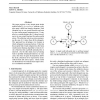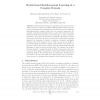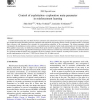99 search results - page 8 / 20 » Action Selection in Bayesian Reinforcement Learning |
104
click to vote
NIPS
2008
14 years 11 months ago
2008
Research in animal learning and behavioral neuroscience has distinguished between two forms of action control: a habit-based form, which relies on stored action values, and a goal...
ICML
2003
IEEE
15 years 10 months ago
2003
IEEE
The paper explores a very simple agent design method called Q-decomposition, wherein a complex agent is built from simpler subagents. Each subagent has its own reward function and...
108
click to vote
IAT
2005
IEEE
15 years 3 months ago
2005
IEEE
This paper presents a self-organizing cognitive architecture, known as TD-FALCON, that learns to function through its interaction with the environment. TD-FALCON learns the value ...
ROBOCUP
2007
Springer
15 years 3 months ago
2007
Springer
Reinforcement learning is a paradigm under which an agent seeks to improve its policy by making learning updates based on the experiences it gathers through interaction with the en...
NN
2002
Springer
14 years 9 months ago
2002
Springer
In reinforcement learning (RL), the duality between exploitation and exploration has long been an important issue. This paper presents a new method that controls the balance betwe...



